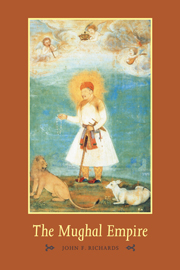Book contents
- Frontmatter
- Contents
- List of maps and tables
- General editor's preface
- Preface
- Introduction
- 1 Conquest and stability
- 2 The new empire
- 3 Autocratic centralism
- 4 Land revenue and rural society
- 5 Jahangir 1605–1627
- 6 Shah Jahan 1628–1658
- 7 The War of Succession
- 8 Imperial expansion under Aurangzeb 1658–1689
- 9 The economy, societal change, and international trade
- 10 Maratha insurgency and Mughal conquest in the Deccan
- 11 The Deccan Wars
- 12 Imperial decline and collapse, 1707–1720
- Conclusion
- Glossary
- Bibliographic essay
- Index
- THE NEW CAMBRIDGE HISTORY OF INDIA
1 - Conquest and stability
Published online by Cambridge University Press: 28 March 2012
- Frontmatter
- Contents
- List of maps and tables
- General editor's preface
- Preface
- Introduction
- 1 Conquest and stability
- 2 The new empire
- 3 Autocratic centralism
- 4 Land revenue and rural society
- 5 Jahangir 1605–1627
- 6 Shah Jahan 1628–1658
- 7 The War of Succession
- 8 Imperial expansion under Aurangzeb 1658–1689
- 9 The economy, societal change, and international trade
- 10 Maratha insurgency and Mughal conquest in the Deccan
- 11 The Deccan Wars
- 12 Imperial decline and collapse, 1707–1720
- Conclusion
- Glossary
- Bibliographic essay
- Index
- THE NEW CAMBRIDGE HISTORY OF INDIA
Summary
The legacy of the Indo-Muslim frontier, the medieval Indian economy, and new connections with Europe helped to create conditions favorable to the rise of an imperial state in North India. These conditions by no means assured that such a state would arise, or that it would be ruled by the Timurids. The Mughal empire was the product of a prolonged political struggle whose outcome was in large measure due to the abilities and good fortune of its founders and builders. The two founders of the Mughal empire, Babur and his son and successor, Humayun, eventually won a bitter struggle with the Afghans for supremacy in northern India. In this conflict the Mughals, although kings, were scarcely to be viewed as emperors. They fought, sometimes against overwhelming odds, to create a Mughal domain in the rich Indo-Gangetic plain of north India.
Their principal adversaries were Afghans who had supplanted Turks and Persians to become the most powerful and widely dispersed foreign Muslim group in northern India. Under the Lodi dynasty thousands of Afghan soldiers and traders had migrated from the mountain valleys of Afghanistan to the plains of north India. Many, like the founder of the Lodi dynasty, Buhlul Lodi, could trace their origins to the overland horse trade. North Indian demands for riding and battle horses created a ready market for the hardy horses of the Central Asian steppe. By this point in time many of these Afghan adventurers had settled on the land as local lords who controlled a Hindu peasantry.
- Type
- Chapter
- Information
- The Mughal Empire , pp. 6 - 28Publisher: Cambridge University PressPrint publication year: 1993



